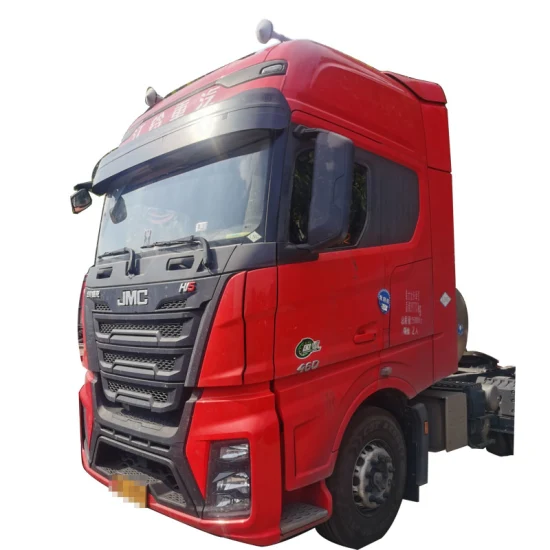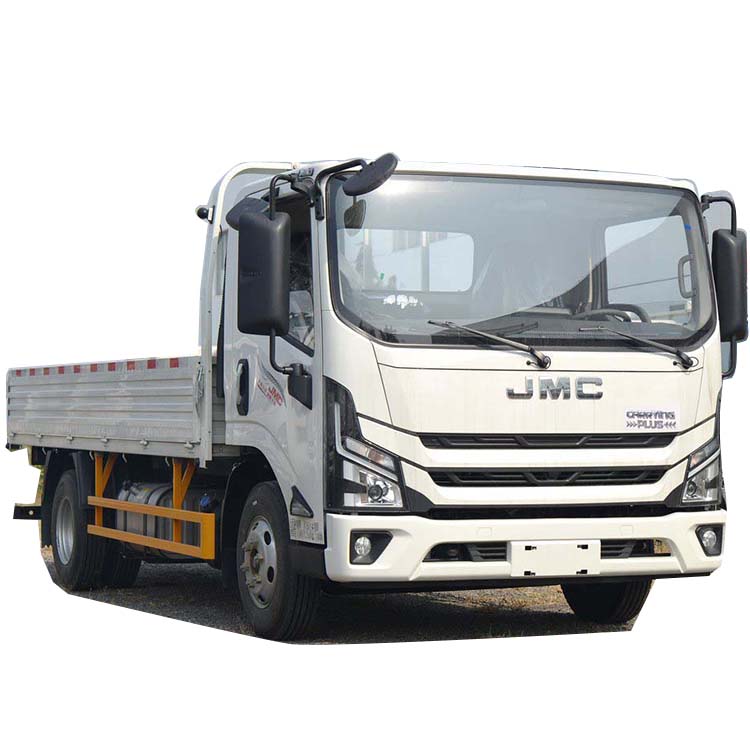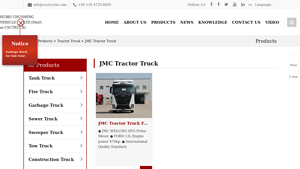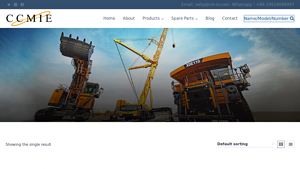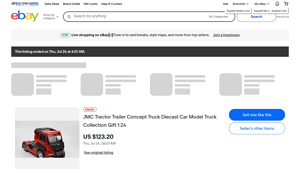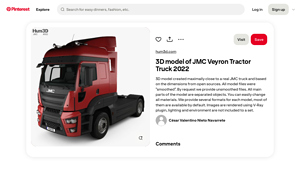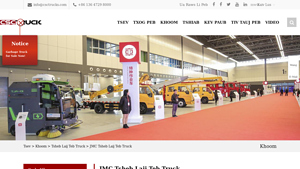Introduction: Navigating the Global Market for jmc Tractor Truck
In the ever-evolving landscape of global logistics, sourcing reliable and efficient jmc tractor trucks can present significant challenges for international B2B buyers. The demand for robust vehicles capable of handling various cargo types is rising, particularly in emerging markets across Africa, South America, the Middle East, and Europe. This guide aims to equip decision-makers with the insights necessary to navigate the complexities of procuring jmc tractor trucks, ensuring that their operations remain competitive and efficient.
Throughout this comprehensive resource, we will delve into the diverse range of jmc tractor trucks available, highlighting their applications across industries—from transportation and logistics to construction and agriculture. We will also address the critical aspects of supplier vetting, allowing buyers to identify trustworthy manufacturers and distributors. Additionally, we will explore pricing structures, operational costs, and maintenance considerations, enabling businesses to make informed financial decisions.
By offering a detailed analysis of the jmc tractor truck market, this guide empowers B2B buyers to streamline their purchasing processes. With actionable insights and expert recommendations, stakeholders can confidently invest in vehicles that enhance their operational capabilities, drive efficiency, and ultimately support their growth objectives in various regional markets.
Understanding jmc Tractor Truck Types and Variations
| Type Name | Key Distinguishing Features | Primary B2B Applications | Brief Pros & Cons for Buyers |
|---|---|---|---|
| JMC Weilong HV5 | 470hp Ford engine, 6×4 drive, 12-speed transmission | Heavy-duty freight transport | Pros: High power output, efficient fuel consumption. Cons: Higher initial investment compared to lighter models. |
| JMC Heavy-Duty Truck | Robust build, large payload capacity, advanced safety features | Construction, logistics, and long-haul trucking | Pros: Excellent durability, versatile applications. Cons: May require more maintenance due to heavy use. |
| JMC Tractor Truck for Van Trailers | Designed for compatibility with various trailer types, low noise levels | Distribution of goods, refrigerated transport | Pros: Adaptability to different trailers, quiet operation. Cons: Limited payload compared to specialized trucks. |
| JMC Tipper Tractor Truck | Hydraulic tipping mechanism, high load capacity | Construction, waste management | Pros: Efficient unloading, great for bulk materials. Cons: Less suited for long-distance transport. |
| JMC Refrigerated Tractor Truck | Insulated body, temperature control systems | Perishable goods transport | Pros: Maintains product integrity, suitable for food logistics. Cons: Higher operational costs due to refrigeration. |
What Are the Key Characteristics of the JMC Weilong HV5 Tractor Truck?
The JMC Weilong HV5 stands out for its powerful 470hp Ford engine and a 12-speed FAST transmission, making it suitable for heavy-duty freight transport. Its 6×4 drive configuration provides superior traction and stability, essential for navigating various terrains. B2B buyers should consider its fuel efficiency and high power output, which can significantly lower operational costs over time. However, the initial investment may be higher than lighter models, which could impact budget planning.
How Does the JMC Heavy-Duty Truck Meet Diverse Business Needs?
The JMC Heavy-Duty Truck is built for robustness, featuring a high payload capacity and advanced safety features. This versatility makes it ideal for construction, logistics, and long-haul trucking applications. Businesses looking for a durable solution will find this model appealing due to its ability to withstand rigorous use. However, it may require more frequent maintenance, which buyers should factor into their long-term operational costs.
Why Choose the JMC Tractor Truck for Van Trailers?
Designed for compatibility with various trailer types, the JMC Tractor Truck for Van Trailers offers flexibility in distribution and refrigerated transport. Its low noise levels enhance driver comfort, making it suitable for urban areas where noise regulations are strict. For B2B buyers, its adaptability to different trailers is a significant advantage, although it may have a lower payload capacity compared to specialized trucks, impacting efficiency in certain applications.
What Are the Advantages of the JMC Tipper Tractor Truck?
The JMC Tipper Tractor Truck features a hydraulic tipping mechanism that facilitates efficient unloading, making it particularly useful in construction and waste management sectors. Its high load capacity allows for the transport of bulk materials, providing operational efficiency. Buyers should consider that while it excels in unloading capabilities, it may not be the best choice for long-distance transport due to its design focus.
How Does the JMC Refrigerated Tractor Truck Support Perishable Goods Transport?
The JMC Refrigerated Tractor Truck is specifically designed to transport perishable goods, featuring an insulated body and advanced temperature control systems. This model is crucial for businesses in the food logistics sector, ensuring product integrity during transport. While it provides essential benefits for perishable goods, B2B buyers should be aware of the higher operational costs associated with refrigeration, which could affect their overall budget.
Key Industrial Applications of jmc Tractor Truck
| Industry/Sector | Specific Application of jmc Tractor Truck | Value/Benefit for the Business | Key Sourcing Considerations for this Application |
|---|---|---|---|
| Logistics and Freight Transport | Long-haul transportation of goods | Efficient cargo movement reduces delivery times and costs | Consider engine power, fuel efficiency, and load capacity |
| Agriculture | Hauling agricultural produce and equipment | Streamlined transport enhances productivity and minimizes spoilage | Evaluate compatibility with trailers and terrain adaptability |
| Construction | Moving heavy construction materials | Reliable transport of materials ensures project timelines are met | Assess payload capacity and durability under heavy loads |
| Oil and Gas | Transporting fuel and chemicals | Safe and efficient delivery meets regulatory standards | Look for specialized tank configurations and safety certifications |
| Waste Management | Collecting and transporting waste | Improved waste management practices contribute to sustainability | Ensure compliance with local waste regulations and vehicle specs |
How is the JMC Tractor Truck Applied in Logistics and Freight Transport?
In the logistics and freight transport sector, the JMC Tractor Truck is essential for long-haul transportation of goods across vast distances. Its powerful engine and robust build facilitate efficient cargo movement, significantly reducing delivery times and operational costs. International buyers should prioritize factors such as engine power, fuel efficiency, and load capacity to ensure that the truck meets their specific logistical needs, particularly in regions with varying road conditions.
What Role Does the JMC Tractor Truck Play in Agriculture?
The agricultural industry benefits greatly from the JMC Tractor Truck, which is used to haul produce and equipment from farms to markets or processing centers. This application streamlines transport, enhancing productivity and minimizing spoilage during transit. Buyers in Africa and South America should evaluate the truck’s compatibility with various trailers and its adaptability to diverse terrains to ensure optimal performance in agricultural settings.
How is the JMC Tractor Truck Used in Construction?
In construction, the JMC Tractor Truck serves as a reliable transport vehicle for heavy materials such as concrete, steel, and machinery. Its sturdy design and high payload capacity enable construction firms to meet project timelines efficiently. Buyers should assess the truck’s payload capacity and durability under heavy loads, ensuring it can withstand the rigorous demands of construction sites, especially in regions like the Middle East where infrastructure projects are booming.
What Are the Applications of the JMC Tractor Truck in Oil and Gas Transportation?
The oil and gas sector utilizes the JMC Tractor Truck for transporting fuel and chemicals safely and efficiently. This application is critical in meeting stringent regulatory standards while ensuring timely delivery to operational sites. B2B buyers must look for specialized tank configurations and safety certifications to comply with local regulations and to mitigate risks associated with transporting hazardous materials.
How Does the JMC Tractor Truck Support Waste Management?
In waste management, the JMC Tractor Truck is employed to collect and transport waste materials, contributing to improved waste management practices. This application is crucial for sustainability efforts, as efficient waste collection ensures timely disposal and recycling processes. Buyers should ensure that the trucks comply with local waste regulations and specifications, focusing on features that enhance operational efficiency and safety in waste handling.
3 Common User Pain Points for ‘jmc Tractor Truck’ & Their Solutions
Scenario 1: Difficulty in Sourcing Reliable Spare Parts
The Problem: B2B buyers often encounter challenges when it comes to sourcing spare parts for JMC Tractor Trucks, especially in regions like Africa and South America where supply chains can be inconsistent. This issue is compounded by the variability in the availability of local suppliers and the potential for counterfeit parts. Delays in repairs can lead to increased downtime, impacting the overall productivity of logistics operations and increasing operational costs.
The Solution: To mitigate this problem, buyers should establish direct relationships with authorized dealers and manufacturers of JMC Tractor Trucks. Engaging with these suppliers not only ensures the authenticity of the spare parts but also provides access to a wider range of components tailored for specific models. It is advisable to maintain a well-documented inventory of commonly used parts and utilize local warehouses to facilitate quicker repairs. Additionally, forming partnerships with logistics companies that specialize in the transportation of automotive parts can help streamline the supply chain, ensuring that essential components are always on hand.
Scenario 2: Navigating Regulatory Compliance for Heavy-Duty Vehicles
The Problem: International buyers, particularly in the Middle East and Europe, face complex regulatory compliance issues when importing JMC Tractor Trucks. Different countries have varied regulations concerning emissions, safety standards, and vehicle specifications, which can lead to delays in customs clearance and potential fines if not adhered to properly.
The Solution: To navigate these challenges effectively, buyers should invest time in understanding the specific regulatory requirements of their target markets. This includes working closely with legal experts or consultants who specialize in automotive regulations in those regions. Before purchasing, it is essential to ensure that the JMC Tractor Truck models being considered meet all necessary specifications. Additionally, collaborating with logistics partners familiar with customs processes can streamline the importation process. Buyers should also consider selecting models that are compliant with international standards, as this can facilitate smoother operations across multiple jurisdictions.
Scenario 3: Ensuring Fuel Efficiency and Cost-Effectiveness
The Problem: Many businesses operating JMC Tractor Trucks are increasingly concerned about fuel efficiency, especially in light of rising fuel costs. Inefficient fuel consumption can significantly impact the overall profitability of logistics operations, and buyers may struggle to identify which models offer the best performance for their specific needs.
The Solution: To address fuel efficiency concerns, buyers should conduct thorough research on the technical specifications of different JMC Tractor Truck models. It is beneficial to compare the fuel consumption rates and engine performance metrics provided by the manufacturer. Engaging in fleet management practices, such as regular maintenance schedules and driver training programs focused on fuel-efficient driving techniques, can further enhance fuel economy. Additionally, buyers should consider leveraging telematics solutions that provide real-time data on fuel usage and vehicle performance. This data can help in making informed decisions about optimizing routes and scheduling maintenance, ultimately leading to reduced fuel costs and improved operational efficiency.
Strategic Material Selection Guide for jmc Tractor Truck
What Are the Common Materials Used in jmc Tractor Trucks?
When selecting materials for the JMC Tractor Truck, several common materials stand out due to their properties, applications, and suitability for different environments. Understanding these materials is crucial for international B2B buyers, especially those operating in diverse climates and regulatory frameworks.
Steel: The Backbone of Truck Durability
Key Properties: Steel is known for its high tensile strength and durability, making it ideal for structural components of the tractor truck. It can withstand high temperatures and pressures, which are common in heavy-duty applications.
Pros & Cons: The primary advantage of steel is its strength and longevity, which translates to reduced maintenance costs over time. However, it is susceptible to corrosion if not properly treated, which can be a significant drawback in humid or coastal environments. The manufacturing complexity is moderate, as steel can be easily welded and formed into various shapes.
Impact on Application: Steel’s strength makes it suitable for chassis and frame construction, where structural integrity is paramount. Buyers should consider the steel’s grade and treatment to ensure compatibility with the specific media they will encounter, such as corrosive materials.
Considerations for International Buyers: Compliance with international standards like ASTM A36 or DIN 17100 is essential. Buyers from regions like Africa and South America should also consider the availability of corrosion-resistant coatings to enhance steel’s lifespan in harsh environments.
Aluminum: Lightweight and Corrosion-Resistant
Key Properties: Aluminum is lightweight yet strong, offering excellent corrosion resistance, which is vital for trucks operating in diverse climates. It has a lower melting point than steel, making it easier to work with in certain manufacturing processes.
Pros & Cons: The main advantage of aluminum is its lightweight nature, which contributes to better fuel efficiency. However, it is generally more expensive than steel and can be less durable under extreme stress. Manufacturing complexity can be higher due to the need for specialized welding techniques.
Impact on Application: Aluminum is often used in components like body panels and fuel tanks, where weight savings can significantly impact performance. Its corrosion resistance makes it suitable for applications involving exposure to chemicals or moisture.
Considerations for International Buyers: Buyers should ensure compliance with standards such as ASTM B209 for aluminum products. In markets like Europe and the Middle East, where weight regulations are strict, aluminum’s lightweight properties can be a significant advantage.
Composite Materials: The Future of Truck Manufacturing
Key Properties: Composites combine materials like plastics and fibers to create lightweight, strong components. They offer excellent resistance to corrosion, chemicals, and temperature variations.
Pros & Cons: The key advantage of composites is their versatility and weight-saving potential, which can lead to improved fuel efficiency. However, they can be more expensive and complex to manufacture, requiring specialized processes and equipment.
Impact on Application: Composites are ideal for non-structural components, such as interior panels and fairings, where weight reduction is critical. Their chemical resistance makes them suitable for trucks that transport hazardous materials.
Considerations for International Buyers: Buyers must consider the specific composite materials used and their compliance with international standards. In regions like Germany, where environmental regulations are stringent, the recyclability of composite materials can be a significant factor.
Rubber: Essential for Performance and Safety
Key Properties: Rubber is flexible and resilient, providing excellent shock absorption and traction. It can withstand a wide range of temperatures and is resistant to wear and tear.
Pros & Cons: The main advantage of rubber is its ability to absorb vibrations and provide a comfortable ride. However, it can degrade over time due to exposure to UV light and ozone, necessitating regular replacements.
Impact on Application: Rubber is primarily used in tires and seals, where performance and safety are critical. The choice of rubber compounds can significantly affect traction and durability, especially in varied terrains.
Considerations for International Buyers: Buyers should ensure that the rubber meets standards like ISO 4632 for tires. In regions with extreme weather conditions, selecting the right rubber compound can enhance performance and safety.
Summary Table of Material Selection for jmc Tractor Truck
| Material | Typical Use Case for jmc Tractor Truck | Key Advantage | Key Disadvantage/Limitation | Relative Cost (Low/Med/High) |
|---|---|---|---|---|
| Steel | Chassis and frame construction | High strength and durability | Susceptible to corrosion | Medium |
| Aluminum | Body panels and fuel tanks | Lightweight and corrosion-resistant | Higher cost and lower durability | High |
| Composite | Interior panels and fairings | Versatile and weight-saving | Expensive and complex manufacturing | High |
| Rubber | Tires and seals | Excellent shock absorption | Degrades over time | Medium |
This strategic material selection guide provides B2B buyers with actionable insights into the materials used in JMC Tractor Trucks, enabling informed decisions that align with their operational needs and regional considerations.
In-depth Look: Manufacturing Processes and Quality Assurance for jmc Tractor Truck
What Are the Key Stages in the Manufacturing Process of JMC Tractor Trucks?
The manufacturing process of JMC Tractor Trucks involves several critical stages that ensure the production of high-quality vehicles. Understanding these stages is essential for B2B buyers looking to partner with reliable suppliers.
Material Preparation
The first step in the manufacturing process is material preparation. This stage includes sourcing high-quality raw materials such as steel, aluminum, and composite materials. JMC prioritizes the use of durable and lightweight materials to enhance the performance and longevity of its trucks. Materials undergo rigorous quality checks before being approved for production, ensuring compliance with international standards.
Forming Techniques Used in JMC Tractor Truck Production
Following material preparation, forming techniques come into play. JMC employs advanced technologies such as stamping, bending, and welding to shape the components of the tractor truck. For instance, robotic welding systems are utilized for precision and consistency, minimizing human error and enhancing structural integrity. This level of automation not only speeds up production but also ensures that each component meets strict quality specifications.
What Does the Assembly Process Look Like for JMC Tractor Trucks?
The assembly stage is where individual components come together to form the complete vehicle. JMC follows a modular assembly approach, allowing for efficient production and easier quality control. Each assembly line is designed to facilitate the installation of various truck systems, including the engine, transmission, and electrical components. Skilled technicians oversee the assembly process, ensuring that each truck is built to meet the design and performance standards set by JMC.
Finishing Processes: How Are JMC Tractor Trucks Prepared for the Market?
Finishing processes include painting, surface treatment, and final inspections. JMC employs a multi-layer painting process that not only enhances the aesthetic appeal of the trucks but also provides protection against environmental factors. Additionally, surface treatments are applied to prevent corrosion and improve durability. After the finishing touches, each vehicle undergoes a thorough inspection to ensure it meets all specifications before being released to the market.
What International Quality Standards and Certifications Does JMC Adhere to?
Quality assurance is paramount in the manufacturing of JMC Tractor Trucks. The company adheres to several international quality standards, including ISO 9001, which outlines the requirements for a quality management system. This certification indicates that JMC consistently provides products that meet customer and regulatory requirements.
Industry-Specific Certifications: What Do They Mean for B2B Buyers?
In addition to ISO certifications, JMC also complies with various industry-specific standards such as CE (Conformité Européenne) and API (American Petroleum Institute). These certifications signify that JMC’s products are safe and reliable for use in different markets, particularly in Europe and other international regions. B2B buyers can benefit from these certifications as they ensure compliance with regional regulations, reducing potential liabilities.
How Does JMC Ensure Quality Control Throughout the Manufacturing Process?
Quality control (QC) checkpoints are integrated at various stages of the manufacturing process. JMC implements three main types of quality control: Incoming Quality Control (IQC), In-Process Quality Control (IPQC), and Final Quality Control (FQC).
-
Incoming Quality Control (IQC): This involves inspecting raw materials upon delivery to ensure they meet specified quality standards before they enter the production line.
-
In-Process Quality Control (IPQC): During the assembly process, periodic checks are conducted to monitor the quality of components being installed. This helps identify any defects early, allowing for timely corrections.
-
Final Quality Control (FQC): Once assembly is complete, each truck undergoes a comprehensive inspection and testing phase, where performance, safety, and aesthetic quality are thoroughly evaluated.
What Testing Methods Are Commonly Used in JMC Tractor Truck Production?
To guarantee the reliability and safety of its tractor trucks, JMC employs a variety of testing methods:
-
Durability Testing: Trucks are subjected to stress tests that simulate real-world conditions, ensuring they can withstand heavy loads and rough terrains.
-
Environmental Testing: This includes exposure to extreme temperatures, humidity, and corrosive elements to assess the vehicle’s performance under varying environmental conditions.
-
Performance Testing: Each truck is evaluated for engine performance, braking efficiency, and fuel consumption to ensure they meet industry benchmarks.
How Can B2B Buyers Verify Supplier Quality Control?
B2B buyers should take proactive steps to verify the quality control processes of their suppliers. Here are several strategies:
-
Supplier Audits: Conducting on-site audits can provide insights into the manufacturing processes and quality control measures in place. This allows buyers to assess the supplier’s compliance with international standards.
-
Quality Reports: Requesting detailed quality assurance reports can help buyers understand the outcomes of various quality checks and tests conducted during production.
-
Third-Party Inspections: Engaging third-party inspection services can provide an unbiased evaluation of the supplier’s manufacturing and quality assurance processes. This is particularly beneficial for international buyers who may not be able to visit the supplier’s facilities.
What Are the Nuances of Quality Control for International B2B Buyers?
For international B2B buyers, especially those from diverse regions such as Africa, South America, the Middle East, and Europe, understanding the nuances of quality control is crucial. Different regions may have varying regulations and standards. Buyers should familiarize themselves with local compliance requirements to ensure that the products they import are suitable for their markets.
Additionally, cultural differences may influence communication and expectations regarding quality. Establishing clear agreements and maintaining open lines of communication can help bridge these gaps and foster successful partnerships.
In summary, JMC Tractor Trucks are manufactured through a meticulous process that emphasizes quality at every stage. By understanding these manufacturing processes and quality assurance measures, B2B buyers can make informed decisions when selecting a supplier, ensuring they receive products that meet their needs and standards.
Practical Sourcing Guide: A Step-by-Step Checklist for ‘jmc Tractor Truck’
When considering the procurement of JMC Tractor Trucks, especially for international markets such as Africa, South America, the Middle East, and Europe, a structured sourcing approach is essential. This guide provides a comprehensive checklist to streamline your purchasing process, ensuring you make informed decisions that meet your operational needs.
Step 1: Define Your Technical Specifications
Before initiating the procurement process, clearly outline your technical requirements. Specify the type of JMC Tractor Truck you need based on your operational demands, such as load capacity, engine type, and fuel efficiency. Understanding these specifications will help in identifying the right model that aligns with your logistics and transportation needs.
Step 2: Research the Market and Pricing
Conduct thorough market research to understand the pricing landscape for JMC Tractor Trucks. Compare prices from various suppliers and consider factors like shipping costs, import duties, and potential discounts for bulk purchases. This step is crucial to ensure you are getting competitive rates and not overpaying.
Step 3: Evaluate Potential Suppliers
Vet suppliers meticulously to ensure reliability and quality. Look for established suppliers with a solid track record in delivering JMC Tractor Trucks. Request company profiles, customer testimonials, and case studies that demonstrate their capability to meet your requirements. Verify their experience in your specific region, as local knowledge can significantly impact service and support.
Step 4: Verify Supplier Certifications
Ensure that your chosen suppliers hold the necessary certifications and compliance documents, such as ISO certifications and adherence to international quality standards. This verification is critical, as it assures you of the truck’s quality and the supplier’s commitment to industry standards, which can mitigate risks related to product reliability and safety.
Step 5: Request Detailed Quotations
Once you have shortlisted potential suppliers, request detailed quotations. These should include pricing, delivery timelines, warranty information, and after-sales support. Pay close attention to the terms and conditions, especially regarding maintenance and spare parts availability, as these factors can influence long-term operational costs.
Step 6: Conduct Site Visits or Virtual Inspections
If possible, arrange site visits to the supplier’s facilities or conduct virtual inspections. This step allows you to assess the production quality and the operational standards of the supplier. Observing the manufacturing process can provide insights into the supplier’s capabilities and the overall quality of the JMC Tractor Trucks being produced.
Step 7: Finalize the Contract and Payment Terms
After selecting a supplier, negotiate and finalize the contract. Ensure that all agreed-upon terms, including delivery schedules, payment methods, and service agreements, are clearly stated. A well-defined contract protects both parties and sets the stage for a successful business relationship.
By following this checklist, you can effectively navigate the procurement process for JMC Tractor Trucks, ensuring that your investment aligns with your operational goals and provides long-term value.
Comprehensive Cost and Pricing Analysis for jmc Tractor Truck Sourcing
Understanding the cost structure and pricing dynamics of JMC Tractor Trucks is essential for international B2B buyers, particularly in regions like Africa, South America, the Middle East, and Europe. This analysis will cover the various cost components involved in sourcing JMC Tractor Trucks, the factors that influence pricing, and provide actionable tips for buyers looking to optimize their purchasing decisions.
What Are the Main Cost Components in JMC Tractor Truck Manufacturing?
-
Materials: The cost of raw materials is a significant portion of the overall expenses. High-quality steel, aluminum, and other composites used in the construction of JMC Tractor Trucks contribute to durability and performance. Buyers should inquire about material specifications and sourcing to ensure they meet their operational requirements.
-
Labor: Labor costs can vary significantly based on the region and the skill level required for assembly and manufacturing. JMC’s facilities in China benefit from a skilled workforce, but international buyers should be aware of labor market conditions that might affect lead times and pricing.
-
Manufacturing Overhead: This includes costs associated with factory operations, such as utilities, rent, and administrative expenses. Efficient manufacturing processes and technologies can help keep overhead low, which can be reflected in pricing.
-
Tooling: The costs associated with the machinery and tools used in production can be substantial, especially for customized or specialized trucks. Buyers requiring unique specifications should factor in potential additional costs for tooling.
-
Quality Control (QC): Ensuring the trucks meet international quality standards incurs costs. A robust QC process can enhance reliability but may influence the final price.
-
Logistics: Transportation costs from the manufacturing facility to the buyer’s location can vary widely based on distance, shipping method, and Incoterms. It’s crucial for buyers to understand these costs and include them in their total cost analysis.
-
Margin: Supplier profit margins will also affect pricing. Understanding the typical margins in the industry can help buyers negotiate better deals.
What Influences the Pricing of JMC Tractor Trucks?
-
Volume and Minimum Order Quantity (MOQ): Higher purchase volumes can lead to reduced per-unit costs due to economies of scale. Buyers should discuss MOQs with suppliers to potentially lower overall costs.
-
Specifications and Customization: Custom features or specifications will typically increase costs. Buyers should clearly define their requirements to receive accurate quotes and avoid unexpected charges.
-
Material Quality and Certifications: Trucks built with higher-grade materials or those that meet specific international certifications may have higher price points. Buyers should assess the value of these certifications against their operational needs.
-
Supplier Factors: The reputation and reliability of the supplier can influence pricing. Established suppliers with a track record of quality and service may command higher prices but offer greater assurance of product reliability.
-
Incoterms: The choice of Incoterms can significantly impact the total landed cost. Buyers should carefully evaluate shipping terms and responsibilities to avoid unforeseen costs.
What Are the Best Negotiation Tips for International Buyers?
-
Research and Prepare: Understand the market price for JMC Tractor Trucks and have comparative quotes ready. This knowledge empowers you to negotiate effectively.
-
Consider Total Cost of Ownership (TCO): Evaluate not just the purchase price but also maintenance, fuel efficiency, and resale value. A slightly higher upfront cost may lead to lower operational costs over time.
-
Build Relationships: Establishing a strong rapport with suppliers can lead to better terms and pricing. Long-term relationships often yield benefits in negotiations.
-
Leverage Volume Discounts: If possible, consolidate purchases or collaborate with other buyers to meet MOQ requirements, which can lead to substantial savings.
-
Be Aware of Pricing Nuances: International buyers should be mindful of currency fluctuations, import duties, and tariffs that may affect the final cost. Having a comprehensive understanding of these factors will assist in budget planning.
Conclusion
While specific pricing for JMC Tractor Trucks can vary based on numerous factors, understanding the underlying cost structure and the elements that influence pricing is crucial for international B2B buyers. By applying strategic negotiation techniques and considering the total cost of ownership, buyers can make informed decisions that align with their operational goals.
Disclaimer: Prices are indicative and subject to change based on market conditions and supplier agreements. Always request formal quotes for accurate pricing.
Alternatives Analysis: Comparing jmc Tractor Truck With Other Solutions
Introduction to Alternative Solutions for JMC Tractor Truck
When considering the acquisition of a tractor truck, it’s essential to evaluate various options that cater to specific operational needs. The JMC Tractor Truck presents a robust solution, but buyers should also explore alternatives that might offer different advantages in performance, cost, or operational fit. This analysis will compare the JMC Tractor Truck with two viable alternatives: the HOWO Prime Mover and the FAW Tractor Head.
Comparison Table
| Comparison Aspect | JMC Tractor Truck | HOWO Prime Mover | FAW Tractor Head |
|---|---|---|---|
| Performance | 470hp Ford engine, 6×4 configuration | 420hp engine, 6×4 configuration | 460hp engine, 6×4 configuration |
| Cost | Competitive pricing | Moderate pricing | Slightly higher than JMC |
| Ease of Implementation | User-friendly design, quick setup | Standardized setup, requires training | Moderate complexity, training needed |
| Maintenance | Low maintenance costs | Moderate, parts readily available | Higher costs, but good support |
| Best Use Case | Long-haul and heavy-duty transport | Construction and heavy loads | Versatile, suitable for various loads |
Detailed Breakdown of Alternatives
HOWO Prime Mover
The HOWO Prime Mover is a well-regarded alternative, especially in markets where heavy-duty performance is essential. With a power output of 420hp, it is slightly less powerful than the JMC but is known for its reliability in tough conditions, particularly in construction and mining operations. The pricing is moderate, making it accessible, but potential buyers should prepare for some training to operate it effectively, as it comes with a standard setup that may not be as intuitive as JMC’s design. Maintenance costs are reasonable due to the availability of parts, though they can be slightly higher than those of the JMC.
FAW Tractor Head
FAW Tractor Heads offer a robust solution for B2B buyers looking for versatility. With a power output of 460hp, they provide a balance between performance and efficiency. While the cost is slightly higher than that of the JMC Tractor Truck, the FAW model is well-supported in terms of service and parts availability, making it a reliable choice for businesses. The implementation might involve moderate complexity, requiring some training for optimal operation. However, this tractor head excels in various applications, from logistics to construction, making it a strong contender in the market.
Conclusion: Choosing the Right Tractor Truck for Your Needs
Selecting the appropriate tractor truck requires a thorough understanding of your specific operational needs, budget, and the types of loads you will be transporting. The JMC Tractor Truck is a compelling choice for those prioritizing cost-effectiveness and ease of use, particularly in long-haul applications. However, alternatives like the HOWO Prime Mover and FAW Tractor Head may provide superior performance in heavy-duty contexts or offer greater versatility, albeit at a higher cost. Ultimately, B2B buyers should assess their unique requirements against these options to make an informed decision that aligns with their operational objectives.
Essential Technical Properties and Trade Terminology for jmc Tractor Truck
What Are the Key Technical Properties of JMC Tractor Trucks?
When considering the procurement of JMC Tractor Trucks, understanding the technical specifications is crucial for making informed purchasing decisions. Here are some essential properties to consider:
1. Engine Specifications
The JMC Tractor Truck features a powerful Ford engine, typically rated at 470 horsepower. This high output is essential for heavy-duty applications, enabling the truck to carry substantial loads over long distances. For B2B buyers, evaluating engine performance ensures that the vehicle meets operational demands without compromising efficiency.
2. Transmission Type
Equipped with a FAST 12-speed transmission, JMC Tractor Trucks offer smooth gear shifts that enhance driving comfort and fuel efficiency. A robust transmission system is vital for businesses that rely on long-haul transport, as it directly impacts the vehicle’s performance under load and overall fuel consumption.
3. Payload Capacity
The gross vehicle weight rating (GVWR) for JMC Tractor Trucks can reach up to 25,000 kg. This specification is critical for businesses in logistics and transportation, as it determines the maximum weight the truck can safely carry. A higher payload capacity allows for more efficient deliveries and reduces the need for multiple trips.
4. Wheelbase and Dimensions
With a wheelbase of 4,650 mm (3300 mm + 1350 mm) and overall dimensions of 6920 mm x 2550 mm x 3520 mm, the JMC Tractor Truck is designed for stability and maneuverability. Understanding these dimensions helps businesses assess whether the vehicle can navigate the specific routes and loading docks typical in their operations.
5. Fuel Tank Capacity
The fuel tank capacity of approximately 500 liters is significant for long-distance hauls, minimizing the frequency of refueling stops. For international buyers, especially in regions with limited fuel access, a larger tank can enhance operational efficiency and lower downtime.
6. Tire Specifications
The use of MICHELIN 315/80R22.5 tires signifies durability and reliability. Quality tires improve traction and reduce maintenance costs, making them an essential consideration for businesses focused on long-term asset management.
Which Trade Terms Are Commonly Used in JMC Tractor Truck Transactions?
Navigating the procurement process involves understanding specific industry jargon. Here are key terms frequently encountered:
1. OEM (Original Equipment Manufacturer)
OEM refers to companies that produce parts and equipment that may be marketed by another manufacturer. In the context of JMC Tractor Trucks, OEM parts ensure compatibility and reliability, which is crucial for maintenance and repairs.
2. MOQ (Minimum Order Quantity)
MOQ is the smallest number of units a supplier is willing to sell. Understanding MOQ helps buyers evaluate the feasibility of their purchases, especially for businesses looking to optimize inventory levels and costs.
3. RFQ (Request for Quotation)
An RFQ is a document sent to suppliers asking for price quotes for specific products or services. For B2B buyers, issuing an RFQ for JMC Tractor Trucks allows for price comparison, helping to secure the best deal.
4. Incoterms (International Commercial Terms)
Incoterms define the responsibilities of buyers and sellers in international transactions, covering aspects like shipping, insurance, and tariffs. Familiarity with these terms is essential for businesses engaging in cross-border trade, as they affect cost and risk management.
5. Lead Time
Lead time refers to the time taken from placing an order to the delivery of goods. Understanding lead times for JMC Tractor Trucks is crucial for supply chain planning and can significantly impact operational efficiency.
6. Warranty
A warranty is a promise from the manufacturer regarding the condition of the vehicle and its parts. For B2B buyers, a comprehensive warranty can mitigate risks associated with vehicle performance and maintenance costs.
By familiarizing themselves with these technical properties and trade terms, international buyers can make more informed decisions when investing in JMC Tractor Trucks, ensuring that they meet their operational requirements effectively.
Navigating Market Dynamics and Sourcing Trends in the jmc Tractor Truck Sector
What Are the Key Market Dynamics and Trends Impacting JMC Tractor Trucks?
The global market for tractor trucks is experiencing significant growth, driven by the increasing demand for efficient logistics and transportation solutions across various sectors. For international B2B buyers, particularly in regions such as Africa, South America, the Middle East, and Europe, key drivers include urbanization, rising e-commerce activities, and infrastructure development projects. The JMC tractor truck segment is particularly well-positioned due to its competitive pricing and robust performance characteristics. Emerging trends include the adoption of advanced technologies like telematics and fleet management systems, which enhance operational efficiency and reduce costs. Buyers are increasingly seeking models that integrate these technologies to optimize logistics operations.
Additionally, sustainability considerations are influencing purchasing decisions. Buyers are now prioritizing fuel-efficient vehicles that meet stringent emissions standards, driven by governmental regulations and consumer demand for greener solutions. Furthermore, the growing trend of digital procurement is reshaping sourcing strategies, with B2B buyers leveraging online platforms for real-time inventory checks, price comparisons, and supplier evaluations. This shift is particularly relevant for buyers in developing markets, where access to competitive pricing and product availability is crucial.
How Can Sustainability and Ethical Sourcing Influence B2B Purchases of JMC Tractor Trucks?
Sustainability is becoming an essential consideration in the B2B sector, especially in heavy-duty vehicle procurement. The environmental impact of tractor trucks, particularly concerning emissions and fuel consumption, is a primary concern for international buyers. JMC has taken steps towards sustainability by incorporating advanced engine technologies that reduce emissions and improve fuel efficiency, aligning with global environmental standards.
Moreover, ethical sourcing is gaining traction among B2B buyers. Companies are increasingly scrutinizing their supply chains to ensure that materials are sourced responsibly, and production processes adhere to ethical labor practices. Certifications such as ISO 14001 for environmental management and ISO 26000 for social responsibility can enhance supplier credibility. Buyers can leverage these certifications to ensure that their procurement aligns with their corporate social responsibility (CSR) goals.
The integration of ‘green’ materials and technologies in the manufacturing process of JMC tractor trucks not only meets regulatory requirements but also appeals to environmentally conscious consumers and businesses. This focus on sustainability can be a key differentiator in a competitive market, providing a marketing edge for buyers committed to reducing their carbon footprint.
What Is the Evolution of JMC and Its Impact on the Tractor Truck Market?
Jiangling Motors Corporation (JMC) has a rich history that dates back to its establishment in 1968. Over the decades, JMC has evolved from a local manufacturer into a prominent player in the global heavy-duty truck market, especially known for its tractor trucks. The company has strategically partnered with international automotive giants, such as Ford, to enhance its technological capabilities and product offerings.
This evolution has allowed JMC to develop a range of tractor trucks that combine international quality standards with competitive pricing. The introduction of advanced features, such as efficient powertrains and enhanced safety systems, has positioned JMC tractor trucks favorably in the international market. For B2B buyers, understanding JMC’s journey provides insight into the brand’s reliability and innovation, making it a compelling choice for logistics and transportation needs. As the company continues to innovate and adapt to market demands, it remains a key player for buyers seeking value-driven solutions in the tractor truck sector.
Frequently Asked Questions (FAQs) for B2B Buyers of jmc Tractor Truck
-
How do I ensure the quality of JMC Tractor Trucks before purchasing?
To ensure quality, request a comprehensive product specification sheet from the supplier, including details about the engine, transmission, and chassis. Additionally, ask for certifications that comply with international standards such as ISO and any relevant safety certifications. If possible, visit the manufacturing facility or arrange for a third-party inspection service to assess the trucks before shipment. Checking customer reviews and testimonials can also provide insights into the supplier’s reliability and product quality. -
What are the key features of JMC Tractor Trucks that make them suitable for international markets?
JMC Tractor Trucks are equipped with robust Ford engines, ensuring high performance and fuel efficiency, which is crucial for long-haul transportation. Their heavy-duty design can handle diverse terrains, making them ideal for markets in Africa and South America. Additionally, they comply with international safety and quality standards, which is essential for buyers in Europe and the Middle East. The availability of various configurations for different applications also enhances their adaptability for various logistics needs. -
What customization options are available for JMC Tractor Trucks?
Customization options for JMC Tractor Trucks may include engine specifications, chassis configurations, and trailer compatibility. Buyers can also request specific features such as enhanced suspension systems, additional cargo space, or unique paint finishes. Discussing your requirements with the supplier upfront can help ensure that the trucks meet your operational needs. Additionally, inquire about lead times for custom orders to better plan your logistics. -
What is the minimum order quantity (MOQ) for JMC Tractor Trucks?
The minimum order quantity for JMC Tractor Trucks may vary depending on the supplier and specific models. Typically, MOQs can range from a single unit to several trucks to qualify for bulk pricing. It is advisable to discuss your needs with the supplier to understand their MOQ policies and explore options for aggregating orders with other businesses if necessary. -
What payment terms should I expect when purchasing JMC Tractor Trucks?
Payment terms can vary widely among suppliers, but common practices include a deposit of 30-50% upfront with the balance due upon delivery or before shipping. Some suppliers may offer financing options or letter of credit terms, especially for large orders. Always clarify payment methods and terms in advance to avoid any misunderstandings and ensure smooth transactions. -
How does the logistics process work for shipping JMC Tractor Trucks internationally?
Shipping JMC Tractor Trucks internationally typically involves coordinating with freight forwarders to manage logistics. The process includes selecting the appropriate shipping method (e.g., container shipping, roll-on/roll-off), preparing necessary export documentation, and ensuring compliance with customs regulations in the destination country. It’s essential to discuss shipping timelines and costs with your supplier to plan for delivery effectively. -
What after-sales support is available for JMC Tractor Trucks?
After-sales support often includes warranty services, access to spare parts, and technical assistance. JMC and its suppliers may offer warranties that cover specific components for a set period, ensuring peace of mind for buyers. It is important to inquire about the availability of local service centers and the process for obtaining spare parts to minimize downtime in case of repairs. -
What should I consider when vetting a supplier for JMC Tractor Trucks?
When vetting a supplier, consider their reputation in the industry, years of experience, and customer reviews. Assess their production capabilities and certifications to ensure they meet international quality standards. Additionally, evaluate their communication responsiveness and willingness to provide detailed information about the products. Engaging with references or previous clients can also provide valuable insights into the supplier’s reliability and service quality.
Important Disclaimer & Terms of Use
⚠️ Important Disclaimer
The information provided in this guide, including content regarding manufacturers, technical specifications, and market analysis, is for informational and educational purposes only. It does not constitute professional procurement advice, financial advice, or legal advice.
While we have made every effort to ensure the accuracy and timeliness of the information, we are not responsible for any errors, omissions, or outdated information. Market conditions, company details, and technical standards are subject to change.
B2B buyers must conduct their own independent and thorough due diligence before making any purchasing decisions. This includes contacting suppliers directly, verifying certifications, requesting samples, and seeking professional consultation. The risk of relying on any information in this guide is borne solely by the reader.
Top 6 Jmc Tractor Truck Manufacturers & Suppliers List
1. JMC – WEILONG HV5 Prime Mover
Domain: csctrucks.com
Registered: 2013 (12 years)
Introduction: JMC Tractor Truck for Van Trailers, JMC WEILONG HV5 Prime Mover, FORD 13L Engine power 470hp, International Quality Standard.
2. JMC – Tractor Truck JH476
Domain: ccmsv.com
Registered: 2022 (3 years)
Introduction: JMC Tractor Truck JH476 for sale. Model: JH476. Dimensions: LxWxH: 5925*2550*3520(3610)mm. Wheelbase: 3600mm. Features: European style heavy truck, reliable, durable, safe, intelligent, and comfortable to drive.
3. JMC – Tractor Trailer Concept Truck
Domain: ebay.com
Registered: 1995 (30 years)
Introduction: {‘title’: ‘JMC Tractor Trailer Concept Truck Diecast Car Model Truck Collection Gift 1:24’, ‘price’: ‘US $123.20’, ‘condition’: ‘New’, ‘quantity_available’: 2, ‘shipping_cost’: ‘US $24.95’, ‘shipping_origin’: ‘Greater China’, ‘delivery_estimate’: ‘Estimated between Fri, Sep 26 and Mon, Oct 20 to 84097’, ‘returns’: ’30 days returns, buyer pays for return shipping’, ‘payment_options’: [‘Diners Club’…
4. JMC – 3D Veyron Tractor Truck Model
Domain: pinterest.com
Registered: 2009 (16 years)
Introduction: 3D model of JMC Veyron Tractor Truck 2022, created maximally close to a real JMC truck based on dimensions from open sources. All model files were ‘smoothed’ with an option to provide unsmoothed files upon request. All main parts of the model are separated objects, allowing easy material changes. Several formats are provided for each model, most available by default. Images are rendered using V-Ra…
5. JMC – WEILONG HV5 Prime Mover
Domain: mww.cscvehicle.com
Registered: 2019 (6 years)
Introduction: JMC Tractor Truck, JMC WEILONG HV5 Prime Mover, FORD 13L Cav engine, 470hp, high-quality products, competitive prices, specialized manufacturer and supplier in China, focus on eco-technologies and human-centric solutions.
6. Ford – F-Max Heavy Vehicles
Domain: blueovalforums.com
Registered: 2005 (20 years)
Introduction: Ford F-Max, JMC Weilong HV5, Ford Otosan’s manufacturing capacity of 15,000 heavy vehicles per annum at its Ekesehir plant in Turkey, 31.7% market share of heavy vehicles in Turkey in 2020, production figures: 8358 trucks in 2011, 7839 trucks in 2020, medium duty line can sell 10k a month in a good non-COVID month.
Strategic Sourcing Conclusion and Outlook for jmc Tractor Truck
As the global demand for reliable transportation solutions continues to rise, the JMC Tractor Truck stands out as a competitive option for businesses across Africa, South America, the Middle East, and Europe. By leveraging strategic sourcing, international buyers can access high-performance vehicles that combine quality and affordability, meeting diverse logistical needs.
JMC’s commitment to innovation, including advanced engine technology and robust design, ensures that their tractor trucks deliver exceptional performance while maintaining cost-efficiency. This is particularly advantageous for enterprises looking to optimize their supply chains and improve operational efficiency.
Looking ahead, the market for heavy-duty trucks is poised for growth, driven by increased infrastructure projects and expanding trade routes. International B2B buyers are encouraged to consider JMC Tractor Trucks as a viable investment for future-proofing their logistics operations. By aligning with trusted manufacturers like JMC, businesses can not only enhance their fleet but also contribute to sustainable growth in their respective markets. Engage with JMC today to explore the possibilities and secure a reliable partner for your transportation needs.

